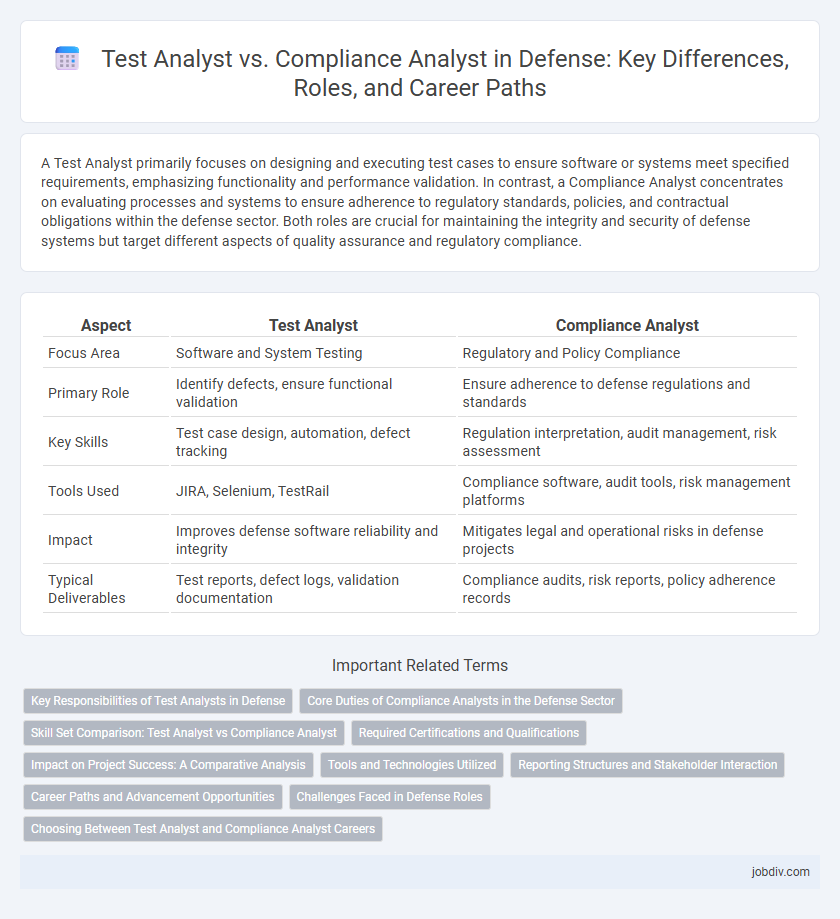A Test Analyst primarily focuses on designing and executing test cases to ensure software or systems meet specified requirements, emphasizing functionality and performance validation. In contrast, a Compliance Analyst concentrates on evaluating processes and systems to ensure adherence to regulatory standards, policies, and contractual obligations within the defense sector. Both roles are crucial for maintaining the integrity and security of defense systems but target different aspects of quality assurance and regulatory compliance.
Table of Comparison
| Aspect | Test Analyst | Compliance Analyst |
|---|---|---|
| Focus Area | Software and System Testing | Regulatory and Policy Compliance |
| Primary Role | Identify defects, ensure functional validation | Ensure adherence to defense regulations and standards |
| Key Skills | Test case design, automation, defect tracking | Regulation interpretation, audit management, risk assessment |
| Tools Used | JIRA, Selenium, TestRail | Compliance software, audit tools, risk management platforms |
| Impact | Improves defense software reliability and integrity | Mitigates legal and operational risks in defense projects |
| Typical Deliverables | Test reports, defect logs, validation documentation | Compliance audits, risk reports, policy adherence records |
Key Responsibilities of Test Analysts in Defense
Test Analysts in defense are responsible for developing and executing structured test plans to validate the functionality, reliability, and security of military software and systems. They analyze system requirements and design test cases to identify defects, ensuring compliance with defense standards such as DoD 5015.2 and cybersecurity protocols. Collaboration with engineers and compliance teams is essential to verify system performance under operational conditions and contribute to mission-critical readiness.
Core Duties of Compliance Analysts in the Defense Sector
Compliance Analysts in the defense sector ensure adherence to government regulations, military standards, and contractual obligations by conducting rigorous audits and risk assessments. They monitor policy implementation, identify non-compliance issues, and develop corrective action plans to maintain operational integrity and avoid legal penalties. Their core duties include evaluating contracts, managing regulatory reporting, and coordinating with legal and procurement teams to uphold defense compliance requirements.
Skill Set Comparison: Test Analyst vs Compliance Analyst
Test Analysts in defense focus on software validation, utilizing skills in automated testing tools, scripting languages, and defect tracking systems to ensure mission-critical application reliability. Compliance Analysts specialize in regulatory frameworks, risk assessment, and adherence to defense standards like NIST and ITAR, requiring expertise in policy interpretation and audit methodologies. Both roles demand strong analytical abilities, but Test Analysts prioritize technical proficiency in test design and execution, while Compliance Analysts emphasize regulatory knowledge and documentation accuracy.
Required Certifications and Qualifications
Test Analysts in defense typically require certifications such as ISTQB Certified Tester or Certified Software Test Engineer (CSTE), along with a strong background in software development and systems engineering. Compliance Analysts need certifications like Certified Information Systems Auditor (CISA) or Certified Compliance & Ethics Professional (CCEP) and extensive knowledge of defense regulations, including ITAR and DFARS. Both roles demand security clearance, with a focus on ensuring adherence to defense standards and mitigating risk through rigorous testing or compliance auditing.
Impact on Project Success: A Comparative Analysis
Test Analysts ensure software reliability by executing detailed test cases and identifying defects early, directly reducing project risks and enhancing product quality in defense systems. Compliance Analysts verify adherence to regulatory standards and security protocols, preventing legal issues and ensuring operational readiness in defense projects. Both roles are crucial for project success, with Test Analysts focusing on technical validation and Compliance Analysts safeguarding regulatory compliance, collectively driving risk mitigation and mission assurance.
Tools and Technologies Utilized
Test Analysts in defense predominantly use automation tools like Selenium, JIRA, and LoadRunner to execute rigorous software testing and validate system functionality against requirements. Compliance Analysts rely on specialized platforms such as RSA Archer, MetricStream, and IBM OpenPages to monitor regulatory adherence, conduct risk assessments, and ensure alignment with defense industry standards. Both roles increasingly leverage AI-driven analytics and cybersecurity toolsets to enhance accuracy and mitigate operational vulnerabilities within defense projects.
Reporting Structures and Stakeholder Interaction
Test Analysts in defense projects typically report to Quality Assurance or Engineering Managers and interact extensively with development teams to ensure system functionality meets specifications. Compliance Analysts report to Risk Management or Legal Departments and engage closely with regulatory bodies and internal audit teams to ensure adherence to defense standards and policies. Both roles require strong communication skills but differ in stakeholder focus: Test Analysts prioritize technical teams, while Compliance Analysts emphasize regulatory and governance stakeholders.
Career Paths and Advancement Opportunities
Test Analysts in defense focus on evaluating software and system performance, offering career advancement toward roles like Test Lead or Quality Assurance Manager. Compliance Analysts emphasize regulatory adherence and risk management, progressing to positions such as Compliance Manager or Risk Officer. Both paths provide opportunities for specialization and leadership, with Test Analysts leaning toward technical expertise and Compliance Analysts toward policy and governance.
Challenges Faced in Defense Roles
Test Analysts in defense face challenges such as ensuring rigorous validation of complex systems under stringent security protocols and rapidly adapting to evolving threat environments. Compliance Analysts encounter difficulties maintaining adherence to multifaceted regulatory frameworks like ITAR, EAR, and DFARS while managing audits and mitigating risks in classified environments. Both roles demand acute attention to detail and collaboration across cross-functional teams to safeguard national security objectives.
Choosing Between Test Analyst and Compliance Analyst Careers
Choosing between Test Analyst and Compliance Analyst careers in defense requires evaluating skill sets and organizational impact. Test Analysts specialize in validating systems and software, ensuring operational functionality meets military standards through rigorous testing protocols. Compliance Analysts focus on regulatory adherence, risk management, and policy enforcement critical to maintaining defense sector security and legal requirements.
Test Analyst vs Compliance Analyst Infographic

 jobdiv.com
jobdiv.com